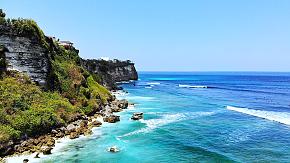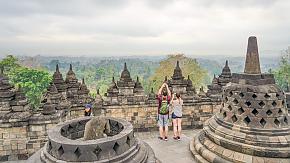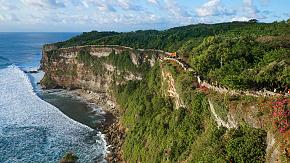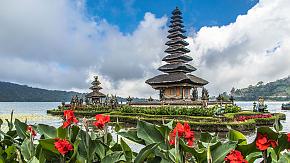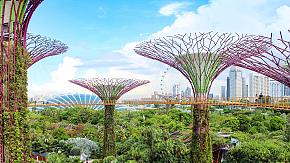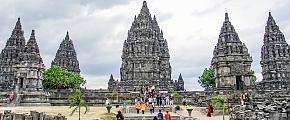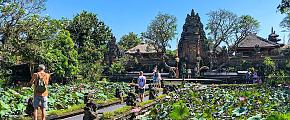Best Festivals in Indonesia 2026: Dates, Activities & Tips
Vibrant festivals in Indonesia throughout the year will take you into a world of wonder and delight. This article is here to recommend 10 incredible festivals that are sure to ignite your senses and captivate your imagination. From colorful celebrations of ancient customs to awe-inspiring showcases of contemporary art, Indonesian festivals have something for everyone! So why wait? Join us on a journey of discovery and start your Indonesia tour.
- Galungan and Kuningan, June 17-27, 2026
- Bali Arts Festival, Mid-June to Mid-July, 2026
- Nyepi (Balinese New Year), March 19-20, 2026
- Tahun Baru lmlek, February 17, 2026
- Lebaran (Eid al-Fitr), March 19-20, 2026
- Bali Spirit Festival, April 15-19, 2026
- Waisak, May 31, 2026
- Natal (Christmas), December 25, 2026
- Java Jazz Festival, May 29-31, 2026
- Jember Fashion Carnaval, July or August, 2026
Galungan and Kuningan, June 17-27, 2026
Galungan takes place every 210 days with a 10-day celebration, and the last day is Kuningan. You may encounter years with two celebrations, such as 2027 and 2028.
During the celebrations, Balinese Hindus will decorate their homes with penjor (decorative bamboo poles). The name "Kuningan" actually derives from the yellow rice cake traditionally made and offered during the festival.
You will witness the colorful and elaborate decorations that adorn Balinese homes and streets, as well as attend traditional dance performances and ceremonies.
Bali Arts Festival, Mid-June to Mid-July, 2026
The Bali Arts Festival usually takes place in the Art Center of Denpasar, lasting for one month. It has different themes each year, showcasing Bali's profound artistic tradition and contemporary vitality. The theme for 2026 has not been announced yet. For reference, in 2025 it was "Jagat Kerthi: Lokahita Samudaya," which means "Universal Harmony for the Common Good," while in 2024 it was "Jana Kerthi Paramaguna Wikrama," meaning "Uplifting Human Dignity and Excellence".
You can enjoy the grand theme parades, join in the classic Legong dance and Kecak dance performances, and visit art exhibitions ranging from traditional to contemporary. It is recommended to wear light and breathable clothing, pay attention to sun protection, and bring an umbrella to deal with hot weather and rain showers. In addition, checking the official schedule in advance and properly keeping your personal belongings can help you fully enjoy the experience.
Nyepi (Balinese New Year), March 19-20, 2026
Nyepi, also known as the "Day of Silence", is the Balinese New Year. Locals and visitors are expected to observe silence and refrain from any activity that might disrupt the peaceful atmosphere, such as working, traveling, or using electronic devices. The streets will empty, and there will be no traffic or noise.
However, Pengerupukan, the day before Nyepi, holds a big parade called "Ogoh-Ogoh". You can join in it, and see large and colorful effigies that represent evil spirits paraded through the streets and then burned.
On the day of Nyepi, you can have a good rest after the vibrant celebration and enjoy a peaceful day in your accommodation. Some hotels will offer special Nyepi services, such as meditation classes and traditional ceremonies, which can be a meaningful way of celebration.
Tahun Baru lmlek (Chinese New Year), February 17, 2026
Tahun Baru Imlek in Indonesia is a term for the Chinese New Year, blending Chinese and Indonesian styles.
The puppet shows in Bogor are highly recommended. You will see lion and dragon dance teams symbolizing power and good luck. They are large in scale and have the traditional Indonesian charm. To get the authentic experience, the Glodok Chinatown in the capital Jakarta is a must-visit. Red lanterns, Spring Festival couplets, and lucky characters create a festive atmosphere.
Also, you can see an interesting custom: locals put red envelopes (Angpao) containing money into the mouths of the lion or dragon puppets, symbolizing exchanging wealth for good luck in the new year.
The end of the Tahun Baru lmlek is Cap Go Meh (meaning "the fifteenth night"), the Lantern Festival in Indonesia, and will be held on March 3rd, 2026. Some communities still retain the element of lighting lanterns, but it focuses more on concluding the New Year through religious procession ceremonies. You will witness the "Tatung Trance Parade", showcasing traditional prayer and exorcism rituals. Especially in Singkawang, the "City of a Thousand Temples".
Lebaran (Eid al-Fitr), March 19-20, 2026
Eid al-Fitr is also known as Lebaran or Hari Raya Idul Fitri in Indonesia. It marks the end of the period of refraining from food, drink, and other physical needs from dawn to sunset. The festivities begin with early morning prayers at the mosque, after which Muslims spend the day with loved ones, exchanging gifts and enjoying festive meals.
You can attend special prayer services at local mosques, and also enjoy traditional Indonesian foods that are served during the festival, such as ketupat (rice cake wrapped in coconut leaves) and opor ayam (chicken in coconut milk).
Bali Spirit Festival, April 15-19, 2026
Taking place in the town of Ubud, the Bali Spirit Festival offers vibrant and diverse activities, such as participating in yoga and meditation workshops, dance and movement classes, healing sessions, and musical performances. What's more, world-renowned yoga experts and dance instructors will be invited to give classes and talks, showing traditional Balinese ceremonies and performances.
It's better to wear comfortable clothing and bring sunscreen, as many of the activities and workshops take place outdoors. Also, bring your own water bottle to take part in sustainable practices due to its encouragement.
Waisak, May 31, 2026
Waisak refers to Vesak or Buddha's Day in Indonesia. It typically involves a series of rituals, including a procession, offerings of flowers and candles, and chanting of prayers. The celebrations usually start with a visit to a Buddhist temple or shrine. The main event, a candle-lit procession, takes place at night. Thousands of devotees carry candles and walk around the temple or shrine three times, which symbolizes the three stages of Buddha's life, i.e., birth, enlightenment, and death.
As the largest Buddhist temple in the world, Borobudur in Central Java is the center of Waisak celebrations in Indonesia. If you are not a fan of big and crowded events, you can consider celebrating on a smaller scale in other Buddhist temples or shrines, such as Mendut Temple and Pawon Temple (located near Borobudur), Candi Sewu in Central Java, and Vihara Dharma Bhakti in Jakarta. Remember to dress modestly, as Waisak is a religious festival.
Natal (Christmas), December 25, 2026
Indonesia's Christmas, Natal, is rich and distinctive. A simple "Selamat Hari Natal!" (Merry Christmas!) can start a unique holiday experience.
You can see two kinds of special Christmas trees: one is the classic plastic artificial Christmas tree, and the other is made of chicken feathers. The celebrations here are also diverse and colorful. In Bali, churches and families decorate with Christmas lights and penjor (ornately decorated bamboo poles). People in North Sulawesi light bamboo torches to illuminate the path to the church. In the Kampung Tugu community in Jakarta, with the traditions of Portuguese descendants, people sing keroncong music door to door, symbolizing forgiveness and harmony.
Moreover, the cuisine is a fusion of Eastern and Western flavors during Natal. Apart from the indispensable nastar (pineapple jam butter cake), kastengel (cheese cookies), and Kue Putri Salju (Snow White cookies) with sugar sprinkles, you can also savor traditional dishes like Nasi Goreng (fried rice).
Java Jazz Festival, May 29-31, 2026
The Java Jazz Festival is one of the largest jazz festivals in the world. It usually lasts for over three days in early March, with performances starting in the afternoon and continuing into the evening.
The festival gathers a diverse lineup of jazz musicians from Indonesia and around the world. You can enjoy live music performances on multiple stages, jazz classes, and exhibitions. There are also food and beverage vendors offering a wide variety of local and international cuisine, as well as bars serving alcoholic and non-alcoholic drinks. While there is no strict dress code for the festival, most people tend to dress comfortably and casually. Because it can get quite hot and humid in Jakarta. You can purchase tickets on the official website. Ticket prices vary depending on the day and type of pass you choose, so it's best to check for the latest information.
Jember Fashion Carnaval, July or August, 2026
The Jember Fashion Carnival (JFC)is one of the most visually stunning annual events in Indonesia. It transforms a 3.6-kilometer-long main street in Renmat District, East Java Province, into an open-air runway. Usually held in August (such as from August 8th to 10th in 2025), it is a showcase of clothing and an open-air performance. You'll see the performers wear creative costumes and march along with music, interacting with the audience on the roadside.
What is particularly special is that many magnificent costumes and floats are created by local sewing groups, students, and artisans. So, you can even have the opportunity to communicate with the creators and know the process of creativity coming into being. By the way, occupy a favorable position along the parade route in advance to participate better.
Enjoy Vibrant Festivals in Indonesia With Us
After knowing these interesting Indonesian festivals, are you already considering experiencing them or visiting other destinations in Indonesia? We'll check the latest and accurate date, arrange a smooth and comfortable trip with professional advice and excellent services. So, feel free to contact us or write to [email protected].
Related Posts You May Like
What Our Clients Say
Explore the latest verified reviews of Odynovo's travel services on Tripadvisor, Google, Trustpilot, Product Review and more trusted platforms.

